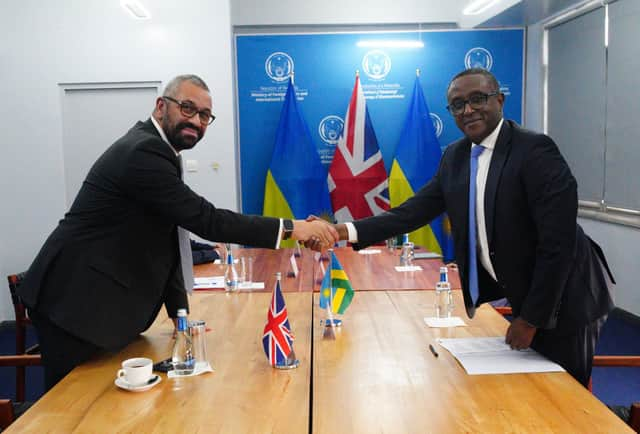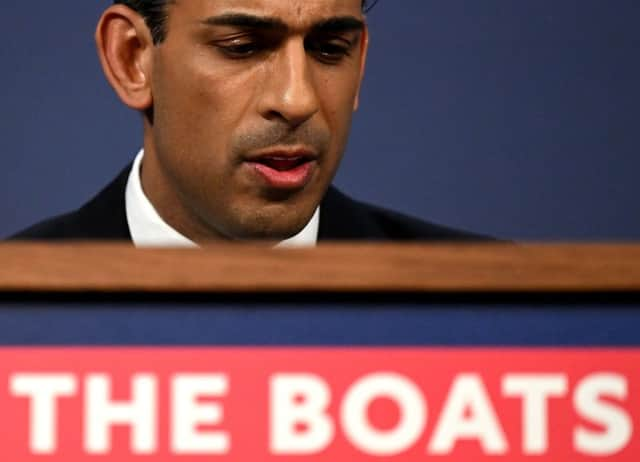Rwanda Bill: James Cleverly announces emergency legislation which disapplies sections of Human Rights Act
and live on Freeview channel 276
James Cleverly has announced new legislation which states that Rwanda is a safe country to send refugees from the UK and disapplies sections of the Human Rights Act.
The government wants to send asylum seekers to the east African country for processing and resettlement in the hope that this deters migrants from making dangerous crossings on small boats. Charities such as the British Red Cross have said deterrent strategies do not work.
Advertisement
Hide AdAdvertisement
Hide AdYesterday, the Home Secretary signed a treaty in Kigali, which states that any refugees sent by the UK cannot be returned to their country of origin. The government hopes that if Parliament passes the new legislation - named the Safety of Rwanda (Asylum and Immigration) Bill - then, along with the treaty, this will mean it can start sending asylum seekers to Rwanda.
Previously, the Supreme Court ruled this policy unlawful, saying refugees sent to the east African nation would be at risk. The court said this was based on the UK’s Human Rights Act, the European Convention on Human Rights and the UN conventions on refugees and torture.
Cleverly said that if the European Court of Human Rights, which interprets the convention, tried to block someone from being deported to Rwanda, a minister would decide whether to comply. He also said it would disapply sections of the UK Human Rights Act to stop individual asylum seekers making legal claims against going to Rwanda.


He said: “It is a Bill which is lawful, it is fair and it is necessary, because people will only stop coming here illegally when they know that they cannot stay here, that they will be detained and quickly removed to a safe third country. Because it is only by breaking the cycle and delivering a deterrent that we will remove the incentive for people to be smuggled here and stop the boats.”
Advertisement
Hide AdAdvertisement
Hide AdIt appears this was not hardline enough for Robert Jenrick, the Immigration Minister, who was not at Cleverly’s side while he put the bill to the House of Commons. Reports suggest Jenrick wanted the bill to go further in disapplying the ECHR, and Home Office minister Laura Farris said he has quit in protest.
Shadow Home Secretary Yvette Cooper told the Commons: “This is total chaos in the Government and in the Conservative Party. This is the desperate dying days of a party ripping itself apart, clearly totally out of ideas, lost any sense of leadership or direction.
“We’ve got a Home Secretary making the statement but the rumours that the immigration minister (Robert Jenrick) has resigned. Where is he? Perhaps he can make that the first question that he answers – whether he still has an immigration minister in place. They’ve got open warfare among their backbenches, the starting gun fired on the next leadership election and once again the whole country paying the price for this chaos.”


Why is this legislation controversial?
The bill is controversial as it declares Rwanda a safe country, not long after a Supreme Court ruling stated it was unsafe for asylum seekers due to the risk of refoulement. Additionally, it will disapply certain sections of the Human Rights Act to block legal challenges to being deported.
Advertisement
Hide AdAdvertisement
Hide AdCleverly said: “Where the ECHR indicates an interim measure relating to the intended removal of someone to Rwanda … a minister of the crown alone, not a court or tribunal, will decide whether the UK complies with those interim measures. To further prevent individual claims to prevent removal the bill disapplies the relevant provisions in the Human Rights Act.”
What this means is that if an asylum seeker makes a legal challenge and cites the European Convention on Human Rights, a government minister will decide whether to deport them and ignore the ECHR and not a court. It will also mean that refugees will not be able to cite certain sections of the Human Rights Act, when arguing that being flown to Rwanda is unlawful.
The government appears reluctant to disapply or leave the ECHR due to its integration with the Good Friday Agreement and the UK’s trade deal with the EU, however Cleverly said it would benefit from “evolution” and “updating”.


Sunak said: “I have been unequivocal that we can no longer tolerate the endless scourge of illegal migration on our country.
Advertisement
Hide AdAdvertisement
Hide Ad“It is costing us billions of pounds and costing innocent lives, and that is why we are taking action to put a stop to it and make clear once and for all that it is Parliament that should decide who comes to this country, not criminal gangs.
“Through this new landmark emergency legislation, we will control our borders, deter people taking perilous journeys across the channel and end the continuous legal challenges filling our courts. And we will disapply sections of the Human Rights Act from the key parts of the Bill, specifically in the case of Rwanda, to ensure our plan cannot be stopped.”
The SNP’s home affairs spokesperson Alison Thewliss: “This is an assault on human rights. We should not let this stand from this House because human rights are universal and they are for everybody, not who the Home Secretary thinks that they should apply to.”
While Naomi Smith, chief executive of Best for Britain, said: “The government can’t pick and choose when human rights apply. We either all have them at all times, or no one does.
Advertisement
Hide AdAdvertisement
Hide Ad“It’s grimly ironic that days before the 75th anniversary of the Universal Declaration of Human Rights, the Prime Minister is seeking to unravel our most basic protections because he’s too weak to stand up to the extreme nativists within his own party.”
Confusingly, just before the bill was announced in the Commons, Rwanda’s foreign affairs minister Vincent Biruta stressed the need for the UK’s legislation to comply with international law.
He said: “It has always been important to both Rwanda and the UK that our rule of law partnership meets the highest standards of international law, and it places obligations on both the UK and Rwanda to act lawfully. Without lawful behaviour by the UK, Rwanda would not be able to continue with the Migration and Economic Development Partnership.”
Is Rwanda safe for refugees?
The government has consistently claimed that Rwanda is safe for refugees - so much so it wants to pass a law stating this. Earlier in the week, Cleverly said: “We are clear that Rwanda is a safe country, and we are working at pace to move forward with this partnership to stop the boats and save lives.
Advertisement
Hide AdAdvertisement
Hide Ad“The Supreme Court recognised that changes may be delivered in future to address the conclusions they reached – and that is what we have set out to do together, with this new, internationally recognised treaty agreement. Rwanda cares deeply about the rights of refugees, and I look forward to meeting with counterparts to sign this agreement and further discuss how we work together to tackle the global challenge of illegal migration.”
Previously, former Home Secretary Suella Braverman visited Rwanda and joked about the houses that had been built for asylum seekers: “These houses are really beautiful, great quality, really welcoming, and I really like your interior designer. I need some advice for myself.” Government sources have also made the point that the UNHCR, the UN's refugee agency, which gave evidence to the Supreme Court criticising Sunak's plan, has sent asylum seekers from Libya to Rwanda.
However, despite representations from the Home Office, the Supreme Court ruled against the plan last month. The five justices - who form the highest court in the land - said they were concerned that genuine asylum seekers were at risk of being returned to their home countries, where they would potentially be in danger, which is known as “refoulement”. The Supreme Court said this was unlawful under several international treaties that the UK has signed, and also goes against domestic law.
A key part of the evidence came from the UNHCR, which found that Israel had entered a similar agreement with Rwanda, and "asylum seekers were routinely moved to a neighbouring country where they were likely to be refouled".
Advertisement
Hide AdAdvertisement
Hide AdIn their ruling, which the other justices agreed with, Lords Reed and Lloyd-Jones said: "The central issue in the present case is therefore not the good faith of the government of Rwanda at the political level, but its practical ability to fulfil its assurances, at least in the short term, in the light of the present deficiencies of the Rwandan asylum system.”
The Supreme Court justices later said there was “evidence of a culture within Rwanda of, at best, inadequate understanding of Rwanda’s obligations under the Refugee Convention”. Rwanda is also effectively a dictatorship, with the ruling party in place since the genocide in 1994. Paul Kagame has been President since 2000. A report by Human Rights Watch in 2021 found that "it is not unusual for Rwandan journalists to go missing, or end up dead in mysterious circumstances".
When asked by NationalWorld, the Prime Minister's spokesman did not deny Rwanda could be called a dictatorship. He said: "Rwanda is a safe country, a vital partner to the UK even beyond the migration partnership. It's not just the UK that works with them [Rwanda] but the UNHCR too."
Comment Guidelines
National World encourages reader discussion on our stories. User feedback, insights and back-and-forth exchanges add a rich layer of context to reporting. Please review our Community Guidelines before commenting.
